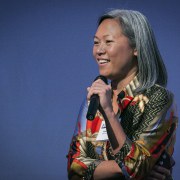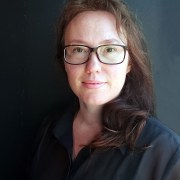Science politics: how and when to take a stand
Find this session's presentations here.
Surveys show that museums and science centres remain the most trusted public organisations, exceeding government agencies and universities. Despite socio-political dissonance in public discourse, the public appears to trust science itself and informal education institutions to present science without agenda. However, content developers are repeatedly challenged by politics inherent to science. Facts are incontrovertible but choice of content, style, and even language are up for debate.
We discuss the biases, responsibilities, and morals at the intersection of sponsorship, politics and literacy. We challenge our participants to explore their own neutrality and methods of advocacy.
Our graphic facilitator will lead the session with hand-drawn images to explore the shared ideas, producing an evolving large-scale concept map that records the dialogue.
Facilitator
Director of Operations and Strategy
Session speakers
Scott Polar Research Institute, University of Cambridge
Ms. Dale is pursuing a PhD at Cambridge University at the Scott Polar Institute. Her studies focus on conflict and consent surrounding extractive industries in Norway. Ms. Dale is an active advocate for restricting and ending oil sponsorship of arts and culture. Her background as an anthropologist and theatermaker provides a unique perspective on the intersection of art, science, and policy.
Ecosystems Services and Management Program (ESM)
International Institute for Applied Systems Analysis (IIASA)
Dr. Salk has been working internationally in forest and natural resource management for more than a decade. His current research at the International Institute for Applied Systems Analysis in Austria evaluates data from crowdsourcing studies and collectively-owned forests. Dr. Salk’s global research has taken him to diverse communities ranging from Colorado in the United States to rural Uganda.
Associate Curator of Natural Science
Oakland Museum of California
Dr. Seiter is a curator of natural sciences at the Oakland Museum of California. Her role in exhibit development extends beyond traditional presentation of science content: her most recent project, “Altered State: Marijuana in California,” engaged the local community in a critical conversation on science and ethics.
Editor & Content Developer
Ms. Sundqvist currently serves as content developer and editor at Universeum. She manages the presentation of both exhibit and web-based science communication to young audiences. Ms. Sunqvist brings a journalistic perspective to her projects and is a constant proponent for accessibility.



